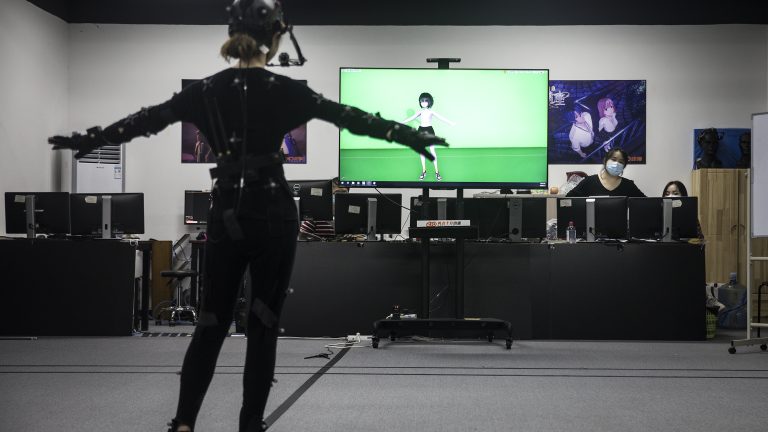Vox Akuma swept a lock of blood-red hair behind his ear and fixed his otherworldly, glittering eyes on the camera, as he’d done nearly every day for months. In a livestream which has garnered more than 350,000 views, the animated star admonished his fans for taking their adoration too far, pushing him to work at a grueling, inhuman pace. “It’s gotten to the point where if I take even more than one day off, drama emerges, arguments happen,” he said.
Over the past decade, entertainment companies in China and Japan have increasingly invested in developing virtual talent: pop stars that appear on stage via hologram, animated personalities who livestream themselves playing games and chatting with fans, brand influencers powered by teams of computer scientists and voice actors. Last year, the value of business driven by virtual idols was $16 billion in China alone, according to research from iiMedia.
YouTuber Akuma and Chinese pop star Luo Tianyi are both virtual idols. Marketing agencies in China bet big that these digital influencers represented the future of celebrity, with their looks and words carefully crafted and controlled by branding agencies and corporations. The thinking went that virtual stars would stay on-message at all times, avoiding the burnout or controversy human influencers might be susceptible to. But at their core, virtual idols typically rely on a single human: an actor or actress wearing a motion capture suit who lends their voice, movements, and facial expressions to bring them to life in real time. When Akuma laughs, that’s the laugh of the actor who plays him; when Luo waves, it’s because a real person is waving. And when they go off-script to complain about exhaustion, overwork, or low pay, that’s a real person complaining about their actual working conditions – underscoring that virtual celebrities are subject to the same concerns and issues as human influencers.
“The key point of VTubers is the ‘people inside,’ the human labor,” said Yijun Luo, doctoral researcher at Hong Kong Baptist University who studies China’s virtual idol industry. While virtual celebrities might look like artificial creations, they’re just as dependent on the pull and personality of an actual human as any real life influencer or celebrity. Some fans become so attached to the unique qualities of the person behind their favorite idol that they can’t bear the thought of anyone else taking their place. It’s got many fans online asking – if the actors and actresses are the soul of these animated superstars, why don’t they get paid as much as human pop stars?
There’s no shortage of money in the industry. Last year, Yuehua Entertainment, which created China’s most-popular virtual pop girl group A-Soul in collaboration with ByteDance, made $5.6 million from its “pan-entertainment business,” which the company said was primarily generated by A-Soul. The virtual stars had partnerships with multinational brands like KFC and L’Oréal as well as domestic giants like Chinese fitness platform Keep. In China, where all entertainment and media are subject to scrutiny and censorship, retailers and entertainment companies found the idea of partnering with manufactured – and controllable – influencer personalities immediately appealing. International brands like McDonald’s and Watson’s even developed their own virtual influencer personas. “This enables brands to better control their marketing cadence, the virtual figure’s physical appearance, and integration into marketing initiatives,” said Pablo Mauron, managing director at Digital Luxury Group in Shanghai.
As interest from fans and brands intensifies and the idol’s activities ramp up to capitalize on it, so can the working hours for the actors in the motion capture suits, referred to as zhongzhiren in Chinese and naka no hito in Japanese – the person in the middle. “How many hours the motion capture actress works is not decided by themselves,” said Mengyu Peng, director of branding at virtual avatar service company SuperACG. “It’s decided by the operations staff behind them.”
“How many hours the motion capture actress works is not decided by themselves. It’s decided by the operations staff behind them.”
Peng told Rest of World that most motion capture actors are expected to actively power their respective avatar four to five hours per day, 22 days per month. That’s not always clear to fans, who constantly clamor for more time with their favorites. “The working conditions of the people in the middle is… just not visible,” said Anthony Fung, professor of media and communication at the Chinese University of Hong Kong.
In China, real influencers are pulled from their platforms every year over controversial statements, said Fung, so virtual influencers can seem like a safer bet than their human counterparts. Virtual stars aren’t supposed to age, get angry, bring up taboo topics, cheat on their partners, or get arrested for tax evasion – that’s the theory, anyway. But virtual influencers are ultimately still reliant on real human performances to bring them to life. Vox Akuma’s confessional is just one of many recent instances in which human concerns have disrupted the big business of virtual celebrity.
Uruha Rushia, a virtual YouTube star at Hololive, one of Japan’s largest virtual talent agencies, was “retired” in February for allegedly leaking business information to her 1.6 million YouTube subscribers during a livestream. Usada Pekora, another Hololive VTuber, announced in May she was taking a break to address a throat injury from three straight years of near-constant livestreaming. The highest-profile incident came the same month, with the departure of a core member of China’s most-popular virtual pop group, A-Soul, which had amassed more than two million followers on Weibo after its 2020 launch, especially among young male fans.
The dynamic, animated girl group consisted of Diana, Ava, Bella, Eileen, and Carol – each embodying different personality archetypes who sing, dance, and chat with admirers on livestream events. Each star is reportedly powered by a real employee, lending her own personality and dancing style to bring her digital avatar to life. Chinese media reports, citing an anonymous source at ByteDance, allege that the real-life counterparts behind the A-Soul stars were paid just a fraction of the group’s revenues.
In May, A-Soul abruptly announced that Carol would stop performing. Fans doxed the actress behind Carol and found what they believed to be evidence that she had complained about harassment and workplace injuries on her personal blog. The production committee behind A-Soul denied accusations of abuse, and said the actresses who brought the beloved idols to life were well-compensated, and received 10% of the revenue generated from livestreams.
“There’s the feeling that it’s a lot of hard work for very little reward.”
Carol’s departure prompted a wider discussion about the working conditions of the people that gave each virtual character their unique ways of speaking, singing, and dancing. “Wearing the motion capture suits is exhausting, and it is tiring to jump around every day,” one VTuber told Chinese outlet Biede. “There’s the feeling that it’s a lot of hard work for very little reward.”
One fan in Shanghai, who preferred to go by his English name, Ajax, for privacy concerns, is one of those who abandoned A-Soul to stan the actress who once played her. In the past, Ajax enjoyed Carol’s performances and jokes in a virtual world, but reports of labor disputes brought him back to reality. “The character Carol is still in the hands of the companies,” Ajax told Rest of World. “But it has lost its soul.”
Rather than continuing to follow A-Soul, Ajax and other fans like him have become supporters of the real human actress who played Carol. They don’t know her name, or what she looks like, but fans have flocked to a particular profile on Weibo and Bilibili that they believe represents her. Behind a profile photo featuring Sanrio character Cinnamoroll, she interacts with more than ten thousand fans a day, sharing her sleeping and snacking habits and Covid-19 test results. One song she posted on Bilibili in July has garnered more than 850,000 views. Though the person behind the profile has not confirmed outright that they previously worked for A-Soul, fans continue to find their way to her account, drawn by the strength of their attachment for the person who powered their once-beloved idol. They leave words of support and admiration. And these days, no one calls her Carol.



